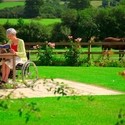Disabled customers
VisitBritain/Pawel Libera

Disabled customers
Disclaimer: While every effort has been made to ensure the accuracy of the information contained in the Pink Book, we regret that we cannot be responsible for any errors. The Pink Book contains general information about laws applicable to your business. The information is not advice, and should not be treated as such. Read our full disclaimer.
Key facts
The Equality Act 2010 applies to all businesses.
The act protects anyone who is disabled, is thought to be disabled, or is associated with someone who is disabled.
The act gives these people rights of access to goods, facilities and services (including tourist attractions and accommodation) and ensures that they are treated no less favourably than other customers.
You are also required to make reasonable adjustments to the way you deliver your services and to the physical features of your premises to make it easier for disabled guests to use them.
It would be unlawful to refuse access to a disabled person accompanied by an assistance dog, except in the most exceptional circumstances.
The Equality Act 2010
The Equality Act 2010was introduced to consolidate and strengthen all anti-discrimination legislation (including disability discrimination legislation). The act builds on the Disability Discrimination Act 1995 (DDA) which gives disabled people rights of access to goods, facilities and services, which includes tourist accommodation, by specifically banning discrimination against people associated with disabled people (for example carers, friends and family) and people presumed to be disabled. These rights are enforceable by any individual through the Courts, if necessary.
Does the act apply to me?
Yes: if you provide any sort of goods or services to the public, the act applies to you.
How is ‘disabled’ defined?
For the purpose of the law, disabled people are all those whose physical and mental impairments have a substantial and long-term adverse effect on their ability to carry out normal, day-to-day activities.
This includes those who have cancer, HIV and multiple sclerosis, and those who have other progressive conditions likely to result in an impairment which has a substantial adverse effect. These people become covered by the act from the time they are diagnosed.
Note: a disability may not always be apparent, so it is important not to make assumptions.
Types of discrimination
There are four types of disability discrimination covered by the Equality Act 2010. They are:
- Direct discrimination;
- Indirect discrimination;
- Discrimination arising from a disability;
- Discrimination by association.
Direct discrimination
This is discrimination directly associated with a person’s disability. As a ‘service provider’, you need to make sure you treat disabled customers the same as you treat other customers. You would be treating customers with disabilities less favourably if you:
- Refuse to serve them;
- Offer less favourable terms;
- Offer a lower standard of service compared with what you normally offer.
It is important to note that the Equality Actdoes not allow any justification for direct discrimination. If you treat someone less favourably, the act allows them to seek damages from you.
An example of unequal treatmentwould be if a guesthouse or attraction refused access to someone who is mentally impaired, on the basis that they felt the person would upset other customers.
Indirect discrimination
This is where a business policy, while applying to all customers, would have a greater impact on disabled customers. Examples could include:
- Serving breakfast only in a room that is down a set of stairs.
- Providing information on an attraction that was only in writing.
The Equality Actdoes allow indirect discrimination if there is ‘objective justification’. For example, it may be justified to only allocate loft rooms to people who are able to move unescorted, on the grounds of fire safety. If there is no objective justification (cost is generally not acceptable), then reasonable adjustments (see below) need to be undertaken to adapt to the circumstances of the disabled customer. For example, information in large font sizes or audio tours could be provided.
Discrimination arising from a disability
This is where the discrimination is based on a consequence of the disability rather than the disability itself. Examples would include:
- Banning a person with Tourette’s syndrome from an event or area because their outbursts may offend other customers.
- Providing plastic cups and plates to a person with muscular dystrophy because you think that they might break items.
Discrimination by association
This is discrimination against someone associated with a disabled person, such as a carer, friend or member of the family. Examples may include:
- Refusing the booking of a non-disabled couple because it was known they have a disabled child which they might bring with them.
- Making the carer of a disabled person sleep in the same room to ensure that they don’t disturb other guests.
How does the act impact me?
To ensure that you do not discriminate against disabled people or their associates, the law requires you to make reasonable adjustments to both your property and business practices.
Reasonable adjustments
You should make reasonable adjustments to the way you deliver your services to make it easier for disabled guests to use them.
The duty is anticipatory, meaning you should consider in advance how to make your services accessible to disabled customers. Waiting for customers to ask you to do something may not be enough.
You should make reasonable adjustments where, if the adjustment were not made, a disabled person would be at a substantial disadvantage compared to people who are non disabled. The question is whether the adjustment is a reasonable one to make in all the circumstances.
The Equality Act 2010 sets out the three requirements for making reasonable adjustments:
1. Adjustments to a policy or procedure
- Monitor your policies and procedures to ensure that they are not putting disabled people at a substantial disadvantage in comparison to non-disabled people when accessing goods, facilities and services.
- Take reasonable steps to ensure that any policies or procedures that put disabled people at a substantial disadvantage are changed or ended.
Note: even if you do not allow animals, you must allow assistance dogs.
2. Adjustments involving the provision of auxiliary aids and services
- Anticipate what auxiliary aids or services you need to make available to disabled individuals who would otherwise be at a substantial disadvantage compared to non-disabled people. For example, provide large-print menus for visually-impaired guests, or a hearing loop at a service counter for customers who use hearing aids.
3. Adjustments to physical features
- You have a duty to take reasonable steps to remove, alter or provide a way of avoiding any physical barriers that make it impossible or unreasonably difficult for disabled people to make full use of facilities. This can include, for example, providing ramp access at steps, or a lift if reasonable. If this is not possible, you must look at how the service can be provided by an alternative method.
The need for reasonable adjustments also applies to your website, which may be the first point of contact for a disabled person.
What is reasonable?
Often simple measures can make your facilities more accessible, for example taking more time to help disabled guests, letting them know how to ask for help, and arranging appropriate training for you and your staff.
You are only required to do what is ‘reasonable’. What might be considered reasonable for a national hotel chain may not be so for a small attraction. What is a reasonable step for a particular service provider depends on all the circumstances of the case. It will vary according to:
- The type of service being provided.
- The nature of the service provider and its size and resources.
- The effect of the disability on the individual disabled person.
However, without intending to be exhaustive, the following are some of the factors which might be taken into account when considering what is reasonable:
- Whether taking any particular steps would be effective in overcoming the substantial disadvantage that disabled people face in accessing the services in question.
- The extent to which it is practical for the service provider to take the steps.
- The extent of any disruption which taking the steps would cause.
- The extent of the service provider’s financial and other resources.
- The amount of any resources already spent on making adjustments.
The act permits service providers to justify less favourable treatment (and in some instances failure to make a reasonable adjustment) when there is no possibility to do so, despite the fact that this would mean that a disabled person is treated less favourably. An example is where an historic listed building would have to change the structure of the building to allow step-free access to all floors. Service providers do therefore have flexibility when considering how to make their services accessible to disabled people. In this example, a video tour of the inaccessible floors could be made available as a reasonable adjustment.
It is important to note that you are unable to pass on the cost of making reasonable adjustments to your disabled customers.
Assistance dogs
Assistance dogs are not pets. Thousands of people rely on an assistance dog to help them with day-to-day activities that many others take for granted. It is not only blind people who are helped by assistance dogs; they are also trained to help those with hearing loss, epilepsy, diabetes, physical mobility problems and more. Assistance dogs carry out a variety of practical tasks for people, as well as supporting their independence and confidence.
Assistance dog owners are protected by the act in a number of ways:
1. Reasonable adjustments
It will almost always be reasonable not to apply a ‘no dogs’ policy for assistance dog owners, and a failure to do so would amount to unlawful discrimination.
2. Discrimination arising from disability
You must not treat a disabled person unfavourably because of something connected to their disability. For example, if a hotel or attraction has a ‘no dogs’ policy and they bar someone who uses an assistance dog, not because of their disability but because they have a dog with them, this would be discrimination arising from disability unless the business can objectively justify what it has done.
Guidance from the Equality and Human Rights Commission (EHRC) states: ‘It would be unlawful to refuse access to a disabled person accompanied by an assistance dog except in the most exceptional circumstances’.
Tourism providers will understandably wish to ensure that only genuine assistance dog users are able to access these rights. However, in determining the legitimacy of assistance dogs, providers should note:
- There is no definition of an assistance dog in the act (other than in relation to carriage of an assistance dog in taxis).
- The act does not specify acceptable standards of training, behaviour or health; assistance dogs can be owner-trained.
- The act does not state that assistance dogs have to be registered (there is no regulatory system for the registration of assistance dogs).
- The act does not state that assistance dogs require any identification documents or an identifying harness or jacket.
- There are no blanket exceptions in the act to cover assistance dogs in food service (or preparation) areas, refusal due to allergies, or refusal due to owners’ pets.
There is no reference in the Equality Act (or supporting Statutory Code of Practice) to ‘support animals’ – including therapy animals or comfort animals that people may have to help them cope with illness, anxiety, or mental health issues. However, it is important to note that the Act protects any person that has a physical or mental impairment which has a long term and substantial adverse effect on their ability to carry out normal day-to-day activities (the Act’s definition of disability). Therefore, you should attempt to accommodate the needs of someone who has a support animal for such conditions, and have a valid, justifiable reason if you refuse to allow the animal on the premises.
Ultimately, only a court can determine whether a refusal of service is unlawful, and such a determination would be highly dependent on the specific facts and circumstances of the particular case.
Good practice
In terms of what you should do in relation to disabled customers, good practice includes:
- Thinking and planning ahead.
- Not making assumptions based on stereotypes.
- Asking a disabled person or organisation what is required if you are in doubt.
- Respecting the dignity of your disabled guest.
- Establishing a positive policy and practices.
- Training staff accordingly.
Note: a willingness to help and an attentive ear can help when considering how to make your services accessible to disabled customers. Disabled people will tell you what you need to do to help them best. Also bear in mind that accessibility is often about making compromises, as a feature that will make things easier for one person might make them more difficult for another.
Providing accessibility information
Disabled people, their family and friends need accurate accessibility information to make informed decisions as to where to stay and visit, in view of their requirements.
AccessAble’s Detailed Access Guides allow tourism operators to provide a quality assured description of their venue’s facilities and services, specifically in relation to individuals with accessibility requirements. Go to the Your Accessibility Guide Portal to get a quote for a professional surveyor to undertake either a Guided or On Site Assessment of your venue and produce a Detailed Access Guide.
Please note that the current AccessibilityGuides.org website will be closing on 30 June 2024. Further guidance on providing information on your key accessibility features on your website will be made available from summer 2024.
Further guidance
Equality Act: good practice
More information on the Equality Act and help with good business practice is available on the EHRC website.
What the Equality Act means for you
The Government has produced a series of guides to help operators understand what the act may mean for their business.
Make your business accessible
Find a range of guidance, tools and resources to help increase engagement with the accessible tourism market in VisitEngland’s Business Advice Hub.
Create an Accessibility Guide
Use VisitEngland’s free online tool to provide potential customers, including disabled people, with important accessibility information about your business.







